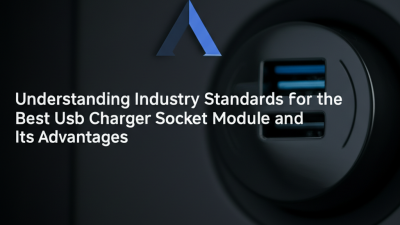
Understanding Industry Standards for the Best Usb Charger Socket Module and Its Advantages
In today's fast-paced digital world, the demand for efficient and reliable power solutions has never been greater, making the Usb Charger Socket Module a crucial component in both residential and commercial environments. Understanding the industry standards associated with these charging modules is essential for consumers and manufacturers alike, as it ensures safety, compatibility, and performance. This blog will explore the various benefits of incorporating a Usb Charger Socket Module into your charging infrastructure, highlighting features such as rapid charging capabilities, energy efficiency, and advanced safety mechanisms. By delving into the standards that govern these devices, we aim to provide insights that will help you make informed decisions when selecting the best Usb Charger Socket Module for your needs, ultimately enhancing convenience and functionality in your everyday life.

The Importance of Industry Standards in USB Charger Socket Modules
When it comes to USB charger socket modules, adherence to industry standards is crucial for ensuring safety, compatibility, and efficiency. The recent announcement of new modular designs highlights the importance of standardization in creating versatile and user-friendly solutions across various sectors. These standards facilitate the development of plug-and-play modules that cater to the diverse needs of both residential and commercial applications. As technology advances, the integration of high-performance USB modules in everyday devices becomes increasingly seamless, making it essential for manufacturers to comply with established guidelines.
Industry standards not only guarantee the quality of USB charger socket modules but also enhance user experience. For instance, the introduction of dual-port USB modules that meet safety certifications demonstrates how manufacturers are responding to the growing demand for efficient charging solutions. Modular designs allow for easy upgrades and replacements, leading to longer product lifespans and reduced electronic waste. With the ongoing development of innovative charging technologies, staying aligned with industry standards ensures that both consumers and businesses can rely on safe, efficient, and future-proof devices.
Key Features to Look for in a Quality USB Charger Socket
When selecting a USB charger socket module, it's essential to consider several key features that can greatly enhance its performance and safety. First, ensure the module supports fast charging capabilities. According to a recent industry report by MarketsandMarkets, the global fast charging market is projected to reach $33.5 billion by 2025, emphasizing the growing demand for speedy charging solutions. Look for modules with Power Delivery (PD) technology, as this can dynamically adjust the power output depending on the device’s requirements.
Another important feature to examine is the compatibility with multiple device types. A quality USB charger socket should support various protocols like QC (Quick Charge) and BC (Battery Charging). This multi-compatibility not only increases the utility of the socket but also provides a better user experience. Additionally, it's critical to ensure the module comes with built-in protection features, such as over-current and over-voltage protection, which can reduce the risk of damage to devices. According to the International Electrotechnical Commission (IEC), safety compliance ratings are essential for hazardous environments and can help manufacturers avoid potential liabilities.
Tips: Always check the amperage rating to find a module that can deliver sufficient power for your devices. For optimal performance, consider a socket that features additional USB ports for simultaneous charging. Regularly updating your charging equipment to meet the latest standards can also ensure safety and efficiency in your electronic devices.
Comparing Different Types of USB Charger Socket Modules
When it comes to choosing the best USB charger socket module, understanding the different types available is essential. There are primarily three categories: standard USB, USB fast charger, and USB-C modules. Standard USB modules typically offer a lower charging speed, making them suitable for simple devices like controllers or Bluetooth speakers. These are cost-effective options for users who do not require rapid charging times.
In contrast, USB fast charger modules can deliver higher power output, allowing for quicker charging of smartphones and tablets. These modules often utilize technologies like Qualcomm Quick Charge or Power Delivery, making them ideal for users who are always on the go and want to minimize downtime. Lastly, USB-C modules have gained popularity due to their versatility and ability to support both data transfer and charging at higher speeds. They are increasingly being adopted in modern devices, making them a future-proof option for consumers looking to upgrade their charging solutions. Each type of USB charger socket module offers distinct advantages, catering to various user needs and preferences in today’s tech-driven world.
Benefits of Using High-Quality USB Charger Socket Modules
High-quality USB charger socket modules offer numerous advantages that significantly enhance our charging experiences. With the rapid evolution of technology, USB Type-C has emerged as the standard connector for powering and transferring data across various devices. The shift to USB-C not only provides faster charging but also supports higher power outputs, such as the recently unveiled 240W charger, which achieves an impressive 95% efficiency. This efficiency is crucial for both consumer electronics and professional applications, ensuring devices charge quickly while conserving energy.
Investing in high-quality USB charger socket modules means embracing innovation and reliability. These modules often incorporate advanced designs that maximize safety and performance, accommodating the increasing power demands of modern gadgets. Whether you are powering a home setup or a portable charging station, selecting a well-designed USB charger socket can make a significant difference. As we move forward, understanding and utilizing these high-quality charger modules will be essential for optimizing our charging infrastructure and enhancing our overall tech experience.
Future Trends in USB Charger Technology and Standards
The evolution of USB technology is witnessing significant trends, particularly with the introduction of new standards aimed at enhancing charging efficiency. The recent release of the USB 2.1 specification allows for charging power up to 240W, paving the way for devices like laptops to operate without the need for bulky power adapters. This advancement exemplifies how USB technology is progressively catering to higher energy demands from modern gadgets.
According to a report by the ITU, as of 2022, 73% of the global population aged over 10 owns a mobile phone, indicating a growing reliance on portable devices. Additionally, the We Are Social report highlights that in 2023, internet penetration in regions like Taiwan continues to increase, further emphasizing the need for standardized and efficient charging solutions. The EU's decision to mandate USB Type-C ports for all mobile devices by late 2024 showcases a concerted effort toward interoperability and user convenience. This regulatory push not only simplifies the charging process for consumers but also drives manufacturers to adopt common charging protocols, thereby reducing electronic waste and promoting sustainability.
